17 feb 2016

By Ben White
The case for a boycott of Israel is straightforward, based on: the reality of Israel’s policies of colonialism and apartheid; the Palestinians’ appeal for solidarity, including the 2005 call for a global Boycott, Divestment, and Sanctions (BDS) campaign; and the effectiveness of BDS as a tactic.
But what about a cultural boycott? This is a problem for some people who agree with the above argument – yet it is also based on a similar, logical argument.
First, it is part of the broader case for BDS, as outlined above – though with some particular angles of its own. For example, Israeli settler-colonialism has always included attacks on Palestinian culture, from the looting of libraries during the ethnic cleansing of 1948, through to the violent attacks by Israeli authorities on Palestinian cultural events in Occupied East Jerusalem. In addition, there is a specific cultural boycott call from Palestinians: the Palestinian Campaign for the Academic and Cultural Boycott of Israel (PACBI) urges cultural workers worldwide to “comprehensively and consistently boycott all Israeli academic and cultural institutions as a contribution to the struggle to end Israel’s occupation, colonisation and system of apartheid.”
Second, the boycott is a response to the complicity of Israel’s cultural institutions in Israel’s crimes. The PACBI-developed guidelines are quite clear in this respect, that as far as the BDS movement is concerned, it is an “institutional boycott” that is being called for. Habima Theatre, for example, performs in West Bank settlements, whose very existence is part of an inherently discriminatory, apartheid system. The Israel Philharmonic Orchestra, meanwhile, is proud to perform “special concerts for IDF soldiers at their outposts”.
Third, Israel has chosen to mobilise culture as a means of international propaganda, to create a brand for the state that masks policies slammed by United Nations agencies and numerous human rights groups as constituting systematic discrimination, segregation and forced displacement. In 2005, Israeli newspaper Ha’aretz revealed plans by the Ministry of Foreign Affairs to adopt “a new means of presenting Israel to the world”. The shift meant giving Israeli diplomats abroad the ability to decide “when and how often the State of Israel will represent itself through a booklet explaining the need for the separation fence, and when and how often it will do so through, say, a play.”
A senior ministry official at the time commented: “We are seeing culture as a hasbara tool of the first rank, and I do not differentiate between hasbara and culture.” Hasbara, literally "explanation", is “a form of propaganda aimed at an international audience”.
In 2008, the Israeli government hired a British PR firm “to create a brand disconnected from the Arab-Israeli conflict that focuses instead on Israel’s scientific and cultural achievements.” Post-Operation Cast Lead, in 2009, an official declared: We will send well-known novelists and writers overseas, theatre companies, exhibits. This way, you show Israel’s prettier face, so we are not thought of purely in the context of war.
An individual who – ironically and unwittingly – perhaps best makes the case for a cultural boycott is Idan Raichel, the well-known Israeli singer-songwriter and musician who on 23 February, will be performing at London’s Barbican Centre. Internationally, Raichel is portrayed almost as a saint. The Boston Globe has hailed his work as “a fascinating window into the young, tolerant, multi-ethnic Israel taking shape away from the headlines”, describing him as “a humanist and compulsive intercultural collaborator”.
“Israel’s most ubiquitous export since drip irrigation,” in the words of The Jerusalem Post, Raichel’s music is lauded as “a multi-ethnic tour de force” and a celebration of “diversity and coexistence.” Raichel’s track record, however, is something quite different. In 2007, for example, he performed at the 40th-anniversary celebration of Gush Etzion, a cluster of illegal settlements in the southern West Bank that restrict Palestinians’ access to agricultural and cultural resources.
His appearance at the event was denounced by Israeli anti-occupation activists, but Raichel was unmoved; in a BBC interview in 2010 he justified the decision. Raichel has praised the military as a “basic ingredient” of Israeli society, and given his support for a "Thank Israeli Soldiers" initiative.
More disturbingly still, in late 2013 Raichel used his Instagram account to come out in defence of a former Israeli army interrogator accused of torture.
Raichel is a willing recruit in Israeli government propaganda efforts, stating in a 2008 interview: “We certainly see ourselves as ambassadors of Israel in the world, cultural ambassadors, hasbara ambassadors, also in regards to the political conflict.”
In 2012, he told an Israeli newspaper: “I believe our role as artists [is] to enlist in Israeli hasbara.” In 2005, Raichel toured North American campuses, according to Ha’aretz, thanks to “financial support” from Israel’s Ministry of Foreign Affairs as part of its "Israel beyond the conflict" scheme. More recently, Raichel has been sent to local schools by Israel’s embassy in Washington DC.
In 2006, he met with American journalists as part of a propaganda junket organised by the Israeli government and advocacy groups, a trip that reflected “an out-of-box approach” to “hasbara”. Raichel has, in other words, become “an ambassador without portfolio”, and his music a form of “soft-diplomacy”. In 2012, a former Israeli consulate official in the US praised The Idan Raichel Project as “one of Israel’s most effective ambassadors”, adding: “The Hasbara value is priceless”.
The Times has described Idan Raichel as a “one-man Middle East peace accord”. Through the disparity between his image and his politics, and his willing participation in government rebranding efforts, Raichel is in fact a one-man argument for cultural boycott.
Ben White is the author of "Israeli Apartheid: A Beginner’s Guide’ and ‘Palestinians in Israel: Segregation, Discrimination and Democracy". - The article was published in the Middle East Eye website.
The case for a boycott of Israel is straightforward, based on: the reality of Israel’s policies of colonialism and apartheid; the Palestinians’ appeal for solidarity, including the 2005 call for a global Boycott, Divestment, and Sanctions (BDS) campaign; and the effectiveness of BDS as a tactic.
But what about a cultural boycott? This is a problem for some people who agree with the above argument – yet it is also based on a similar, logical argument.
First, it is part of the broader case for BDS, as outlined above – though with some particular angles of its own. For example, Israeli settler-colonialism has always included attacks on Palestinian culture, from the looting of libraries during the ethnic cleansing of 1948, through to the violent attacks by Israeli authorities on Palestinian cultural events in Occupied East Jerusalem. In addition, there is a specific cultural boycott call from Palestinians: the Palestinian Campaign for the Academic and Cultural Boycott of Israel (PACBI) urges cultural workers worldwide to “comprehensively and consistently boycott all Israeli academic and cultural institutions as a contribution to the struggle to end Israel’s occupation, colonisation and system of apartheid.”
Second, the boycott is a response to the complicity of Israel’s cultural institutions in Israel’s crimes. The PACBI-developed guidelines are quite clear in this respect, that as far as the BDS movement is concerned, it is an “institutional boycott” that is being called for. Habima Theatre, for example, performs in West Bank settlements, whose very existence is part of an inherently discriminatory, apartheid system. The Israel Philharmonic Orchestra, meanwhile, is proud to perform “special concerts for IDF soldiers at their outposts”.
Third, Israel has chosen to mobilise culture as a means of international propaganda, to create a brand for the state that masks policies slammed by United Nations agencies and numerous human rights groups as constituting systematic discrimination, segregation and forced displacement. In 2005, Israeli newspaper Ha’aretz revealed plans by the Ministry of Foreign Affairs to adopt “a new means of presenting Israel to the world”. The shift meant giving Israeli diplomats abroad the ability to decide “when and how often the State of Israel will represent itself through a booklet explaining the need for the separation fence, and when and how often it will do so through, say, a play.”
A senior ministry official at the time commented: “We are seeing culture as a hasbara tool of the first rank, and I do not differentiate between hasbara and culture.” Hasbara, literally "explanation", is “a form of propaganda aimed at an international audience”.
In 2008, the Israeli government hired a British PR firm “to create a brand disconnected from the Arab-Israeli conflict that focuses instead on Israel’s scientific and cultural achievements.” Post-Operation Cast Lead, in 2009, an official declared: We will send well-known novelists and writers overseas, theatre companies, exhibits. This way, you show Israel’s prettier face, so we are not thought of purely in the context of war.
An individual who – ironically and unwittingly – perhaps best makes the case for a cultural boycott is Idan Raichel, the well-known Israeli singer-songwriter and musician who on 23 February, will be performing at London’s Barbican Centre. Internationally, Raichel is portrayed almost as a saint. The Boston Globe has hailed his work as “a fascinating window into the young, tolerant, multi-ethnic Israel taking shape away from the headlines”, describing him as “a humanist and compulsive intercultural collaborator”.
“Israel’s most ubiquitous export since drip irrigation,” in the words of The Jerusalem Post, Raichel’s music is lauded as “a multi-ethnic tour de force” and a celebration of “diversity and coexistence.” Raichel’s track record, however, is something quite different. In 2007, for example, he performed at the 40th-anniversary celebration of Gush Etzion, a cluster of illegal settlements in the southern West Bank that restrict Palestinians’ access to agricultural and cultural resources.
His appearance at the event was denounced by Israeli anti-occupation activists, but Raichel was unmoved; in a BBC interview in 2010 he justified the decision. Raichel has praised the military as a “basic ingredient” of Israeli society, and given his support for a "Thank Israeli Soldiers" initiative.
More disturbingly still, in late 2013 Raichel used his Instagram account to come out in defence of a former Israeli army interrogator accused of torture.
Raichel is a willing recruit in Israeli government propaganda efforts, stating in a 2008 interview: “We certainly see ourselves as ambassadors of Israel in the world, cultural ambassadors, hasbara ambassadors, also in regards to the political conflict.”
In 2012, he told an Israeli newspaper: “I believe our role as artists [is] to enlist in Israeli hasbara.” In 2005, Raichel toured North American campuses, according to Ha’aretz, thanks to “financial support” from Israel’s Ministry of Foreign Affairs as part of its "Israel beyond the conflict" scheme. More recently, Raichel has been sent to local schools by Israel’s embassy in Washington DC.
In 2006, he met with American journalists as part of a propaganda junket organised by the Israeli government and advocacy groups, a trip that reflected “an out-of-box approach” to “hasbara”. Raichel has, in other words, become “an ambassador without portfolio”, and his music a form of “soft-diplomacy”. In 2012, a former Israeli consulate official in the US praised The Idan Raichel Project as “one of Israel’s most effective ambassadors”, adding: “The Hasbara value is priceless”.
The Times has described Idan Raichel as a “one-man Middle East peace accord”. Through the disparity between his image and his politics, and his willing participation in government rebranding efforts, Raichel is in fact a one-man argument for cultural boycott.
Ben White is the author of "Israeli Apartheid: A Beginner’s Guide’ and ‘Palestinians in Israel: Segregation, Discrimination and Democracy". - The article was published in the Middle East Eye website.
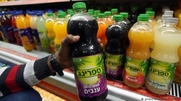
US Customs has reportedly reissued orders to importers to label all products from West Bank settlements as not being from Israel, Israeli channel 2 said Tuesday, slamming the move as deceiving Congress.
US authorities explained that they are just reissuing policies from 1995, while Israeli group International Law Forum said these claims are false.
The group noted that the 1995 guidelines only applied to goods from the Palestinian Authority (PA) in West Bank, which was newly established in the Oslo Accords. The guidelines were meant to distinguish PA goods as not being Israeli.
Congress is trying to bring US Secretary of State John Kerry in for a hearing to clarify the topic, according to Channel 2, which noted that the State Department claims it was not involved in the January labeling statement.
Yesha Council of West Bank settlement said "unfortunately, again, it was discovered that the (Barack) Obama and Kerry administration is working in improper ways against the settlements."
US authorities explained that they are just reissuing policies from 1995, while Israeli group International Law Forum said these claims are false.
The group noted that the 1995 guidelines only applied to goods from the Palestinian Authority (PA) in West Bank, which was newly established in the Oslo Accords. The guidelines were meant to distinguish PA goods as not being Israeli.
Congress is trying to bring US Secretary of State John Kerry in for a hearing to clarify the topic, according to Channel 2, which noted that the State Department claims it was not involved in the January labeling statement.
Yesha Council of West Bank settlement said "unfortunately, again, it was discovered that the (Barack) Obama and Kerry administration is working in improper ways against the settlements."
15 feb 2016
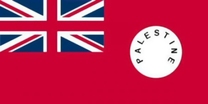
On February 14th, 2016, the UK Government announced that it would be setting up guidelines to prevent public bodies from supporting the Palestinian rights through their procurement and investment policies.
Hugh Lanning, Chair of Palestine Solidarity Campaign, has condemned this move as ‘a gross attack on our democratic freedoms and the independence of public bodies from Government interference’.
“As if it is not enough that the UK Government has failed to act when the Israeli Government has bombed and killed thousands of Palestinian civilians and stolen their homes and land, the Government are now trying to impose their inaction on all other democratic and public bodies.
This makes it clear where this Government stands on international law and human rights. Despite the Government admitting that Israel’s occupation and denial of Palestinian rights is plain wrong and illegal – when it comes to it they will insulate Israel from the consequences of its own actions. It seems that for this UK Government, whatever crimes against international law Israel commits, having a military ally trumps the rights of their own citizens and institutions in this country to support human rights.”
Sara Apps, interim Director of Palestine Solidarity said, according to the PNN: “People around the world have been asked by the Palestinian people to support boycott, divestment and sanctions because it is a peaceful and effective way to challenge and pressure the Israeli Government to end their violations.
If the Israeli Government want to be free of the pressure of boycott, divestment and sanctions and international censure the answer is simple – end your illegal occupation and abide by international law.
It is shameful that our Government is prepared to side with an oppressive state over the rights of an oppressed people in this way. We urge people to support our campaign to change Government policy and support the rights of their citizens to act against human rights violations.
Hugh Lanning, Chair of Palestine Solidarity Campaign, has condemned this move as ‘a gross attack on our democratic freedoms and the independence of public bodies from Government interference’.
“As if it is not enough that the UK Government has failed to act when the Israeli Government has bombed and killed thousands of Palestinian civilians and stolen their homes and land, the Government are now trying to impose their inaction on all other democratic and public bodies.
This makes it clear where this Government stands on international law and human rights. Despite the Government admitting that Israel’s occupation and denial of Palestinian rights is plain wrong and illegal – when it comes to it they will insulate Israel from the consequences of its own actions. It seems that for this UK Government, whatever crimes against international law Israel commits, having a military ally trumps the rights of their own citizens and institutions in this country to support human rights.”
Sara Apps, interim Director of Palestine Solidarity said, according to the PNN: “People around the world have been asked by the Palestinian people to support boycott, divestment and sanctions because it is a peaceful and effective way to challenge and pressure the Israeli Government to end their violations.
If the Israeli Government want to be free of the pressure of boycott, divestment and sanctions and international censure the answer is simple – end your illegal occupation and abide by international law.
It is shameful that our Government is prepared to side with an oppressive state over the rights of an oppressed people in this way. We urge people to support our campaign to change Government policy and support the rights of their citizens to act against human rights violations.
13 feb 2016
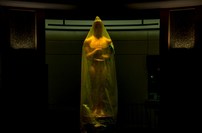
By Ryvka Barnard
Only some of the stars nominated for this year’s Academy Awards will go home with the golden Oscar trophy. But all of the nominees, winners or losers, will get consolation gift bags worth $200,000 according to a report by the Daily Beast.
Among the overpriced frivolous gifts that these stars will receive are skin creams, Audi car rentals, fitness training, cosmetic surgery procedures and a 10-day first class trip to Israel, worth $55,000, care of the Israeli government.
There are a few stories within this story.
We could talk about the grotesque excesses in the lives of the rich and famous in times of growing global inequality. We could mention the sickening societal obsession with unreachable beauty norms that can only be achieved through buying more fitness and beauty products, including costly surgery.
But what is a trip to Israel doing in that package?
This wouldn’t be the first time that stars are offered highly subsidised or complimentary trips to Israel. By now it’s such a convention that the Israeli Ministry of Tourism has a page on its official website dedicated to celebrity visits.
But make no mistake, this is not simply the work of ambitious tourism promoters. This is Brand Israel, an Israeli diplomatic strategy which involves courting stars and showering them with free trips, products and propaganda to immunise them against the allure of speaking out in public against Israeli violations of Palestinian rights.
Brand Israel was launched in 2006 with the goal of crafting a new story about Israel internationally; less about violence and military occupation, more about science, technology, fun and sun.
The Israeli government has poured millions of dollars into this pursuit, inviting Hollywood stars, government and business leaders and even religious and cultural minority representatives to take specially tailored trips to see the amazing things that the state of Israel is accomplishing, always with a press conference and photo opportunity with Israeli government officials.
What do they not see on these lavish all-expense-paid trips?
-- The sniper towers and checkpoints along the apartheid wall, from which Israeli soldiers can shoot at Palestinian demonstrations against the brutal military occupation;
-- the prison interrogation rooms, where Palestinian political prisoners, including children, are routinely tortured and denied medical treatment;
-- the Palestinian farmers whose land and livelihoods have been stolen by settlers who then use their outposts as bases from which to attack Palestinian
villages with petrol bombs;
-- the bombed out neighbourhoods in the Gaza Strip where children gather scrap metal to replace construction materials that Israel bans, trying to scrape together a living for their destitute families.
These celebrity tourists are also shielded from seeing the Palestinian popular resistance against oppression, manifesting in protests against the apartheid wall, against land confiscation and home demolitions in the unrecognised villages of the Naqab. They don’t meet the Israeli young people who face jail time for refusing to serve in the occupation army.
These stories are inspiring and move people to action around the world; it’s no wonder the Israeli government wants to repress them. It is no coincidence that this new branding strategy was launched around the same time as over 170 Palestinian civil society organisations called on people around the world to act in solidarity with Palestinians struggling for justice, and to conduct campaigns of boycott, divestment and sanctions (BDS) to expose and end government and corporate complicity in Israel’s apartheid regime.
The BDS movement exposes the real brutality of Israeli colonialism, the same scenes that Brand Israel is designed to conceal. The South African apartheid regime used nearly identical tactics at the height of international opposition to it. Many artists and musicians have refused to be co-opted by the Israeli government to whitewash the brutal reality of Israeli apartheid. Roger Waters, Brian Eno, Lauryn Hill and over 1,000 British artists have pledged not to entertain Israeli apartheid.
Only a few months ago, hundreds of British scholars publicised their own pledge committing to the same principled stance. This isn’t simply a case of artists and academics not wanting to get their hands dirty with the crimes of the Israeli state. It is a push back against Israel’s systematic attempts to repress the reality of apartheid.
That reality can only be hidden if everyone agrees not to talk about it, to look the other way. And Israel invests heavily in getting this to happen. But it simply won’t work. Oscar nominees are receiving free trips to Israel because now more than ever, the state of Israel is feeling the pressure from the ever-growing BDS movement, which aims to put an end to international complicity in Israel’s denial of Palestinian rights.
No matter who goes home with a statue at the end of the awards ceremony, the growing success of the BDS movement shows that the real winners will be the Palestinians struggling for freedom, and all who stand with them for justice.
- Ryvka Barnard is senior campaigns officer on militarism and security at War on Want. The article was published in the Middle East Eye website.
Only some of the stars nominated for this year’s Academy Awards will go home with the golden Oscar trophy. But all of the nominees, winners or losers, will get consolation gift bags worth $200,000 according to a report by the Daily Beast.
Among the overpriced frivolous gifts that these stars will receive are skin creams, Audi car rentals, fitness training, cosmetic surgery procedures and a 10-day first class trip to Israel, worth $55,000, care of the Israeli government.
There are a few stories within this story.
We could talk about the grotesque excesses in the lives of the rich and famous in times of growing global inequality. We could mention the sickening societal obsession with unreachable beauty norms that can only be achieved through buying more fitness and beauty products, including costly surgery.
But what is a trip to Israel doing in that package?
This wouldn’t be the first time that stars are offered highly subsidised or complimentary trips to Israel. By now it’s such a convention that the Israeli Ministry of Tourism has a page on its official website dedicated to celebrity visits.
But make no mistake, this is not simply the work of ambitious tourism promoters. This is Brand Israel, an Israeli diplomatic strategy which involves courting stars and showering them with free trips, products and propaganda to immunise them against the allure of speaking out in public against Israeli violations of Palestinian rights.
Brand Israel was launched in 2006 with the goal of crafting a new story about Israel internationally; less about violence and military occupation, more about science, technology, fun and sun.
The Israeli government has poured millions of dollars into this pursuit, inviting Hollywood stars, government and business leaders and even religious and cultural minority representatives to take specially tailored trips to see the amazing things that the state of Israel is accomplishing, always with a press conference and photo opportunity with Israeli government officials.
What do they not see on these lavish all-expense-paid trips?
-- The sniper towers and checkpoints along the apartheid wall, from which Israeli soldiers can shoot at Palestinian demonstrations against the brutal military occupation;
-- the prison interrogation rooms, where Palestinian political prisoners, including children, are routinely tortured and denied medical treatment;
-- the Palestinian farmers whose land and livelihoods have been stolen by settlers who then use their outposts as bases from which to attack Palestinian
villages with petrol bombs;
-- the bombed out neighbourhoods in the Gaza Strip where children gather scrap metal to replace construction materials that Israel bans, trying to scrape together a living for their destitute families.
These celebrity tourists are also shielded from seeing the Palestinian popular resistance against oppression, manifesting in protests against the apartheid wall, against land confiscation and home demolitions in the unrecognised villages of the Naqab. They don’t meet the Israeli young people who face jail time for refusing to serve in the occupation army.
These stories are inspiring and move people to action around the world; it’s no wonder the Israeli government wants to repress them. It is no coincidence that this new branding strategy was launched around the same time as over 170 Palestinian civil society organisations called on people around the world to act in solidarity with Palestinians struggling for justice, and to conduct campaigns of boycott, divestment and sanctions (BDS) to expose and end government and corporate complicity in Israel’s apartheid regime.
The BDS movement exposes the real brutality of Israeli colonialism, the same scenes that Brand Israel is designed to conceal. The South African apartheid regime used nearly identical tactics at the height of international opposition to it. Many artists and musicians have refused to be co-opted by the Israeli government to whitewash the brutal reality of Israeli apartheid. Roger Waters, Brian Eno, Lauryn Hill and over 1,000 British artists have pledged not to entertain Israeli apartheid.
Only a few months ago, hundreds of British scholars publicised their own pledge committing to the same principled stance. This isn’t simply a case of artists and academics not wanting to get their hands dirty with the crimes of the Israeli state. It is a push back against Israel’s systematic attempts to repress the reality of apartheid.
That reality can only be hidden if everyone agrees not to talk about it, to look the other way. And Israel invests heavily in getting this to happen. But it simply won’t work. Oscar nominees are receiving free trips to Israel because now more than ever, the state of Israel is feeling the pressure from the ever-growing BDS movement, which aims to put an end to international complicity in Israel’s denial of Palestinian rights.
No matter who goes home with a statue at the end of the awards ceremony, the growing success of the BDS movement shows that the real winners will be the Palestinians struggling for freedom, and all who stand with them for justice.
- Ryvka Barnard is senior campaigns officer on militarism and security at War on Want. The article was published in the Middle East Eye website.
12 feb 2016
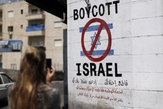
US President Barack Obama reportedly intends to sign a sweeping trade agreement which includes provisions that fail to differentiate between Israel and illegal settlements in the occupied Palestinian territories, as well as discourage the boycott of Israeli goods.
The agreement -- H.R. 644: Trade Facilitation and Trade Enforcement Act of 2015 -- was passed 75-20 on Thursday, and includes a provision that no US court can enforce judgement from a foreign court on a US citizen who “conducts business operations in Israel, or any territory controlled by Israel.”
The provision, in effect, allows US citizens immunity from conducting trade with illegal Israeli settlements, while its terminology fails to distinguish Israeli settlements from the state of Israel, violating the US’ official line against the construction of settlements in occupied East Jerusalem and the West Bank.
The White House, in a statement released Thursday regarding the agreement, said: “As with any bipartisan compromise legislation, there are provisions in this bill that we do not support.”
Of those provisions that the Obama administration did not support was, according to Ma'an, a provision that “contravenes longstanding US policy towards Israel and the occupied territories, including with regard to Israeli settlement activity,” the statement said.
Despite the contravention, Obama plans to sign the agreement into law “to help strengthen enforcement of the rules and level the playing field for American workers and businesses.”
The agreement also includes a provision that in creating commercial partnerships with foreign countries, the US should “discourage politically motivated boycotts of, divestment from, and sanctions against Israel.”
The US government opposes the boycott, divestment, and sanctions (BDS) movement against Israel, and while US law requires that products made in illegal Israeli settlements may not be labeled “Made in Israel,” the law is rarely enforced.
Israel has been struggling to tackle a growing Palestinian-led boycott campaign which has had a number of high-profile successes abroad.
The BDS movement aims to exert political and economic pressure over Israel's occupation of the Palestinian territories in a bid to repeat the success of the campaign which ended apartheid in South Africa.
However, BDS initiatives have also faced pushback abroad, notably in France, where a court ruled in October that a group of activists advocating for BDS were guilty under French hate speech legislation.
The agreement -- H.R. 644: Trade Facilitation and Trade Enforcement Act of 2015 -- was passed 75-20 on Thursday, and includes a provision that no US court can enforce judgement from a foreign court on a US citizen who “conducts business operations in Israel, or any territory controlled by Israel.”
The provision, in effect, allows US citizens immunity from conducting trade with illegal Israeli settlements, while its terminology fails to distinguish Israeli settlements from the state of Israel, violating the US’ official line against the construction of settlements in occupied East Jerusalem and the West Bank.
The White House, in a statement released Thursday regarding the agreement, said: “As with any bipartisan compromise legislation, there are provisions in this bill that we do not support.”
Of those provisions that the Obama administration did not support was, according to Ma'an, a provision that “contravenes longstanding US policy towards Israel and the occupied territories, including with regard to Israeli settlement activity,” the statement said.
Despite the contravention, Obama plans to sign the agreement into law “to help strengthen enforcement of the rules and level the playing field for American workers and businesses.”
The agreement also includes a provision that in creating commercial partnerships with foreign countries, the US should “discourage politically motivated boycotts of, divestment from, and sanctions against Israel.”
The US government opposes the boycott, divestment, and sanctions (BDS) movement against Israel, and while US law requires that products made in illegal Israeli settlements may not be labeled “Made in Israel,” the law is rarely enforced.
Israel has been struggling to tackle a growing Palestinian-led boycott campaign which has had a number of high-profile successes abroad.
The BDS movement aims to exert political and economic pressure over Israel's occupation of the Palestinian territories in a bid to repeat the success of the campaign which ended apartheid in South Africa.
However, BDS initiatives have also faced pushback abroad, notably in France, where a court ruled in October that a group of activists advocating for BDS were guilty under French hate speech legislation.
30 jan 2016
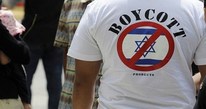
168 Italian academics and researchers from seven universities have signed a petition calling for a freeze on all academic agreements with the Technion Institute (Israel Institute of Technology) and all the Israeli universities.
Hebrew newspaper Yedioth Ahronoth said on Friday that the move was taken because those universities help the Israeli army in the development of offensive weapons used to suppress the Palestinians.
The petition stated that: "We are academics, researchers and lawmakers in the Italian universities, we are deeply concerned by the continued cooperation with the Technion.
The Zionist universities participate in military research and in the development of weapons the Israeli army use against the Palestinian people; in addition, they provide assistance to the Israeli army and its colonization of the Palestinians."
It is also mentioned in the petition that: "Technion is more involved than other Israeli universities in the Israeli military industries system, as it does researches in a series of weapons' technologies that are used to suppress and abuse the Palestinians."
The petition also reads that: "This collaboration makes the Technion an accomplice in violation of international laws; therefore, cooperating with it is cooperating with the Israeli occupation authorities."
Hamas welcomes Italian academics’ petition for boycott of Israel
Islamic Resistance Movement, Hamas, welcomed the petition signed by 168 Italian academics calling for a boycott of Israeli universities for its role in developing Israeli army’s weapons for attacking the Palestinian people.
Hamas spokesman Sami Abu Zuhri opined, in a statement on Saturday, that this petition is an evidence for the case of isolation Israel lives in light of its crimes against the Palestinians. Hamas Movement called for the continuation of such humanitarian and political stances that put pressure on Israel to halt those crimes and violations.
Hebrew newspaper Yedioth Ahronoth said on Friday that the move was taken because those universities help the Israeli army in the development of offensive weapons used to suppress the Palestinians.
The petition stated that: "We are academics, researchers and lawmakers in the Italian universities, we are deeply concerned by the continued cooperation with the Technion.
The Zionist universities participate in military research and in the development of weapons the Israeli army use against the Palestinian people; in addition, they provide assistance to the Israeli army and its colonization of the Palestinians."
It is also mentioned in the petition that: "Technion is more involved than other Israeli universities in the Israeli military industries system, as it does researches in a series of weapons' technologies that are used to suppress and abuse the Palestinians."
The petition also reads that: "This collaboration makes the Technion an accomplice in violation of international laws; therefore, cooperating with it is cooperating with the Israeli occupation authorities."
Hamas welcomes Italian academics’ petition for boycott of Israel
Islamic Resistance Movement, Hamas, welcomed the petition signed by 168 Italian academics calling for a boycott of Israeli universities for its role in developing Israeli army’s weapons for attacking the Palestinian people.
Hamas spokesman Sami Abu Zuhri opined, in a statement on Saturday, that this petition is an evidence for the case of isolation Israel lives in light of its crimes against the Palestinians. Hamas Movement called for the continuation of such humanitarian and political stances that put pressure on Israel to halt those crimes and violations.
29 jan 2016

Following Israeli media furor, the US State Department has clarified that recently announced US guidelines prohibiting settlement products from being labeled 'Made in Israel' were not new, but a "restatement of existing requirements."
US State Department spokesman Mark Toner made the clarification following confusion over a statement, released earlier in the week by US Customs and Border Protection, which said that West Bank products may not be labeled "Made in Israel."
Several media outlets reported the move was initiated by the Obama administration, in line with a recent European Union decision that prohibits settlement products -- as well as any other goods made in the occupied territories -- from being labelled as Israeli.
According to Ma'an, the Obama Administration supported the EU decision, but did not take steps toward similarly far-reaching measures.
Unlike the EU guidelines, US labeling rules do not differentiate between products made in Israel's illegal settlements and those produced elsewhere in the occupied West Bank.
“This guidance was simply a restatement of previous requirements,” Toner said. “It in no way supersedes prior rulings or regulations, nor does it impose additional requirements with respect to merchandise imported from the West Bank, Gaza Strip, or Israel.”
When asked whether the guidelines were reissued due to the fact the law has been “enforced very poorly or not at all” over the last 20-some years, Toner said a number of complaints had been lodged alleging mislabeling of West Bank products, but gave no further information on the origins of these complaints.
He added that the system of labeling required by US customs “in no way” represented “a boycott or anything like that.”
Toner did not clarify the reason behind the decision by US Customs to publicly restate the guidelines. The US Customs’ guidelines on labeling West Bank products initially originated alongside the Oslo Accords in 1993 and was intended to stimulate growth of the Palestinian economy by differentiating between Israeli and Palestinian products.
At that time there were few products made in illegal Israeli settlements in the occupied West Bank. Several campaigns have been launched in the US against the alleged failure of US customs to enforce the guidelines.
US State Department spokesman Mark Toner made the clarification following confusion over a statement, released earlier in the week by US Customs and Border Protection, which said that West Bank products may not be labeled "Made in Israel."
Several media outlets reported the move was initiated by the Obama administration, in line with a recent European Union decision that prohibits settlement products -- as well as any other goods made in the occupied territories -- from being labelled as Israeli.
According to Ma'an, the Obama Administration supported the EU decision, but did not take steps toward similarly far-reaching measures.
Unlike the EU guidelines, US labeling rules do not differentiate between products made in Israel's illegal settlements and those produced elsewhere in the occupied West Bank.
“This guidance was simply a restatement of previous requirements,” Toner said. “It in no way supersedes prior rulings or regulations, nor does it impose additional requirements with respect to merchandise imported from the West Bank, Gaza Strip, or Israel.”
When asked whether the guidelines were reissued due to the fact the law has been “enforced very poorly or not at all” over the last 20-some years, Toner said a number of complaints had been lodged alleging mislabeling of West Bank products, but gave no further information on the origins of these complaints.
He added that the system of labeling required by US customs “in no way” represented “a boycott or anything like that.”
Toner did not clarify the reason behind the decision by US Customs to publicly restate the guidelines. The US Customs’ guidelines on labeling West Bank products initially originated alongside the Oslo Accords in 1993 and was intended to stimulate growth of the Palestinian economy by differentiating between Israeli and Palestinian products.
At that time there were few products made in illegal Israeli settlements in the occupied West Bank. Several campaigns have been launched in the US against the alleged failure of US customs to enforce the guidelines.
28 jan 2016
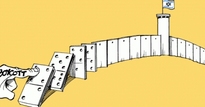
The Israel Today newspaper, on Thursday, said that Israel is setting plans to combat the BDS movement, as it gains ground.
The plan is expected to contain monitoring tools to hinder BDS online activism, in addition to more advanced tools against any of its campaigns.
The BDS movement aims to Boycott, Divest and Sanction Israel for its war crimes against Palestinians. The campaign thrived after last summer’s Israeli offensive on Gaza, which killed over 2,200 Palestinians, most of them children and civilians.
Commenting on the plan to combat BDS, Secretary General of the Palestine National Movement, Dr. Mustafa Al-Barghouthi told the PNN that “this is nothing new coming from Israel.”
“Israel has set its plans long ago and spent millions of dollars to overcome BDS, but has failed,” Barghouthi said. “Instead, the movement is further escalating due to the continuous Israeli aggression, extra-judicial executions, and constantly expanding settlements which Israel refuses to freeze.”
Barghouthi added that this also indicates the amount of losses which have hit Israel, due to the campaign, as economists approximated the losses at $31 billion.
The Israeli plan comes after a number of international companies have cut ties with Israel, including the French giant telecommunications Orange, American Anthropological Association (AAA) , G4S, in addition to closing illegal West Bank factories such as Soda Stream, and current pressures on Airbnb to stop hawking property as "Israeli", in the occupied West Bank.
Last August, Haaretz newspaper said that the Israeli military intelligence monitors all BDS groups and activity all over the world because it forms a great threat to the Israeli economy.
On 18 June 2015 The Israeli Justice Minister, Ayelet Shaked was “putting together a plan of action to for filing civil and criminal lawsuits against BDS activists for damaging Israeli trade, describing the movement as “discriminatory and racist.”
Shaked, last year, likened Palestinians to "snakes", in a post later removed from her Facebook page but widely reported on by the Israeli media, and said that all Palestinians, including mothers, should be killed.
The plan is expected to contain monitoring tools to hinder BDS online activism, in addition to more advanced tools against any of its campaigns.
The BDS movement aims to Boycott, Divest and Sanction Israel for its war crimes against Palestinians. The campaign thrived after last summer’s Israeli offensive on Gaza, which killed over 2,200 Palestinians, most of them children and civilians.
Commenting on the plan to combat BDS, Secretary General of the Palestine National Movement, Dr. Mustafa Al-Barghouthi told the PNN that “this is nothing new coming from Israel.”
“Israel has set its plans long ago and spent millions of dollars to overcome BDS, but has failed,” Barghouthi said. “Instead, the movement is further escalating due to the continuous Israeli aggression, extra-judicial executions, and constantly expanding settlements which Israel refuses to freeze.”
Barghouthi added that this also indicates the amount of losses which have hit Israel, due to the campaign, as economists approximated the losses at $31 billion.
The Israeli plan comes after a number of international companies have cut ties with Israel, including the French giant telecommunications Orange, American Anthropological Association (AAA) , G4S, in addition to closing illegal West Bank factories such as Soda Stream, and current pressures on Airbnb to stop hawking property as "Israeli", in the occupied West Bank.
Last August, Haaretz newspaper said that the Israeli military intelligence monitors all BDS groups and activity all over the world because it forms a great threat to the Israeli economy.
On 18 June 2015 The Israeli Justice Minister, Ayelet Shaked was “putting together a plan of action to for filing civil and criminal lawsuits against BDS activists for damaging Israeli trade, describing the movement as “discriminatory and racist.”
Shaked, last year, likened Palestinians to "snakes", in a post later removed from her Facebook page but widely reported on by the Israeli media, and said that all Palestinians, including mothers, should be killed.
23 jan 2016
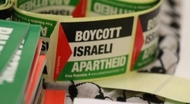
In just three days, an online letter endorsing the academic boycott of Israeli institutions, circulated by Brazilian intellectuals, received 200 signatories from faculty across Brazilian universities.
According to the Palestinian Campaign for the Academic & Cultural Boycott of Israel (PACBI), the letter was signed by well-known academics, including Paulo Sergio Pinheiro, a popular Brazilian diplomat who served on the country’s Truth Commission on human rights abuses that took place during the era of Brazil’s military dictatorship and was the U.N.’s Special Rapporteur on human rights in Myanmar as well as B. Boris Vargaftig, physician, pharmacologist, and one of the most internationally quoted Brazilian academics.
According to the PNN, this campaign came right after extremely popular Brazilian congressman Jean Wyllys accepted to participate in a conference at the Hebrew University of Jerusalem, which has deep ties to human rights abuses against Palestinians.
Most of the University campus is built in the occupied East Jerusalem and, for that reason, was recently the subject of a new and influential boycott.
A letter signed by 351 international academics explains that “while all Israeli universities are deeply complicit in the occupation, settler-colonialism, and apartheid, the Hebrew University of Jerusalem is particularly noteworthy.”
It goes on to highlight how “the university is complicit in the unequal treatment of Palestinians, including those who are citizens of Israel”; “restricts the freedom of speech and protest of its few Palestinian students”; and is affiliated with Ariel University in the occupied West Bank, while refusing to recognize academic credentials from the Palestinian Al Quds University.
According to The Intercept, numerous critics expressed shock and outrage that a standard-bearer of Brazil’s progressive movement would so completely break with his party’s official position in support of the BDS movement.
But Wyllys further inflamed the outrage over the next several days with a series of self-defenses, and speaking about building bridges, dialogues and expressing his position against the academic boycott of Israel.
In a video message posted on Facebook, Paulo Sérgio Pinheiro (one among the 200 signatories of the academic boycott), harshly criticized the congressman.
“Lamentable and deplorable, congressman Jean Wyllys’ comments about his visit to Israel reveal a crass ignorance of and total misinformation about Israel’s current human rights policies,” he said.
One example of his lack of knowledge appeared when he characterized the apartheid wall as being “constructed by Israel to impede terrorist attacks”.
Wyllys’ controversial visit to the Hebrew University and his defense of Israeli policies came at a particularly tense moment in bilateral relations between the two governments.
Brazil’s nominally leftist Worker’s Party (PT) government, led by embattled President Dilma Rousseff, has refused to accept the appointment of Dani Dayan as Israel’s ambassador to Brazil on the grounds that he is a proponent of Israel’s illegal settlements in the occupied West Bank.
Under both Rousseff and her predecessor, PT’s Lula da Silva, their party has been vocally supportive of Palestinians.
PSOL positions itself as the left-wing alternative to the more moderately left PT, making Wyllys’ statements particularly surprising and shocking.
According to the Palestinian Campaign for the Academic & Cultural Boycott of Israel (PACBI), the letter was signed by well-known academics, including Paulo Sergio Pinheiro, a popular Brazilian diplomat who served on the country’s Truth Commission on human rights abuses that took place during the era of Brazil’s military dictatorship and was the U.N.’s Special Rapporteur on human rights in Myanmar as well as B. Boris Vargaftig, physician, pharmacologist, and one of the most internationally quoted Brazilian academics.
According to the PNN, this campaign came right after extremely popular Brazilian congressman Jean Wyllys accepted to participate in a conference at the Hebrew University of Jerusalem, which has deep ties to human rights abuses against Palestinians.
Most of the University campus is built in the occupied East Jerusalem and, for that reason, was recently the subject of a new and influential boycott.
A letter signed by 351 international academics explains that “while all Israeli universities are deeply complicit in the occupation, settler-colonialism, and apartheid, the Hebrew University of Jerusalem is particularly noteworthy.”
It goes on to highlight how “the university is complicit in the unequal treatment of Palestinians, including those who are citizens of Israel”; “restricts the freedom of speech and protest of its few Palestinian students”; and is affiliated with Ariel University in the occupied West Bank, while refusing to recognize academic credentials from the Palestinian Al Quds University.
According to The Intercept, numerous critics expressed shock and outrage that a standard-bearer of Brazil’s progressive movement would so completely break with his party’s official position in support of the BDS movement.
But Wyllys further inflamed the outrage over the next several days with a series of self-defenses, and speaking about building bridges, dialogues and expressing his position against the academic boycott of Israel.
In a video message posted on Facebook, Paulo Sérgio Pinheiro (one among the 200 signatories of the academic boycott), harshly criticized the congressman.
“Lamentable and deplorable, congressman Jean Wyllys’ comments about his visit to Israel reveal a crass ignorance of and total misinformation about Israel’s current human rights policies,” he said.
One example of his lack of knowledge appeared when he characterized the apartheid wall as being “constructed by Israel to impede terrorist attacks”.
Wyllys’ controversial visit to the Hebrew University and his defense of Israeli policies came at a particularly tense moment in bilateral relations between the two governments.
Brazil’s nominally leftist Worker’s Party (PT) government, led by embattled President Dilma Rousseff, has refused to accept the appointment of Dani Dayan as Israel’s ambassador to Brazil on the grounds that he is a proponent of Israel’s illegal settlements in the occupied West Bank.
Under both Rousseff and her predecessor, PT’s Lula da Silva, their party has been vocally supportive of Palestinians.
PSOL positions itself as the left-wing alternative to the more moderately left PT, making Wyllys’ statements particularly surprising and shocking.
